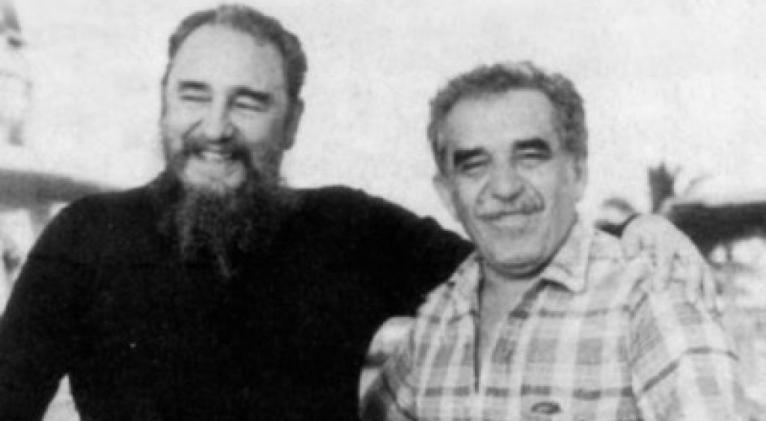The Fidel that I know
especiales

From the renowned writer’s perspective, Our Fidel is revealed over and above his historical achievements, namely, achieving a Revolution bigger than ourselves, under the very nostrils of the empire; moulding a Fatherland recognized for its values of dignity and sovereignty and ensuring that for more than half a century it was untoppled.
The virtues that captivated García Márquez are surely the same that many have perceived. However, he expresses them out of the affection and admiration that he felt for the Commander-in-Chief and this gives greater value to his every word.
Indeed, what fascinated him was the rebel leader’s power to seduce, his searching out problems where they might be, his indomitable patience, iron disciple, the power of an imagination that leads to unexpected events and his emotion to risk, the biggest stimulus of his life.
What made this front line revolutionary stand out in the transcendental events in Cuba in the twentieth and twenty first century was his attitude the face of defeat because “even in the basic actions of everyday life, he appears to obey his own internal logic: he does not even admit it and he does not have a minute of peace while he succeeds in reversing terms and converting them into victory.” considered El Gabo.
Another quality: there is no project, be it grandiose or small, that one cannot undertake with infinite passion, especially if one must challenge adversity. “Never did he appear to be in a better mood and better humor as he did then. Someone that believes to know him well said: “things must be going very badly because you are proud”, related the narrator.
García Márquez thinks that his rarest political virtue is that power to think out the unfolding of an event to its remote consequences. He does not exercise this power through “seeing the light”, but as a result of an arduous, tenacious reasoning, exhaustive analysis and after searching out the reasons.
The stand of innovator appears to be his ideal medium; he begins with a voice that is barely audible but he is gaining ground with his intelligence, charisma and ability. In this way he wins over his audience. “He is an inspiration: a state of irresistible and dazzling grace, that is only denied by those that have not had the glory of experiencing it”. So related the author of The Hundred Years of Solitude.
And when Fidel talks with his people, the dialogue is drenched in the eloquence and frankness of the deepest affection. This is why his people just address him as Fidel - just as they would a close friend, a father or a brother. They hug him, they need him, they raise issues and discuss them with him - an exchange which is one of its kind, where truth without hesitation prevails.
He close friend asserted, “it is then that one discovers the rare human being we fail to see due to the aura surrounding his image. This is the Fidel Castro that I believe I know: A man of austere habits and insatiable dreams; formally educated in Classics; a man of carefully chosen words and gentle manners; a man totally incapable of conceiving an idea that is not colossal”.
For this reason, he dreams with his feet on the ground that Cuban scientists will discover life-saving medicines or the final medicine against cancer. He has created a foreign policy of global power, in an island infinitely smaller than its powerful enemy, yet without violating a single principle, with dignity and ethics as his banner.
So this is Fidel in a nutshell: the first to take arms, the first to set an example; the Fidel that stopped smoking to have the moral authority to fight addiction to tobacco; the Fidel whose conviction it is that moral incentives rather than material ones can change the world and revise history.
It appears perpetual, the meridian clarity of the man of the cruiser, the Granma, the attack on the Moncada barracks, “History will absolve me” and the days of the war in the Sierra Maestra. Today, it is multiplied in a vision of the future of Latin America. The same vision is shared by Simón Bolívar and José Martí: an integral and independent community, capable of bringing light, just like dawn, and moving the destiny of the world.
Forever watchful, defending positions and principles. The United States is the country he knew best after Cuba. He had a deep understanding of the nature of its people, its power structures, the hidden objectives of its governments, an arsenal that helped him to weather the storm inflicted by the criminal economic, financial and commercial embargo against our sovereign nation.
“Something is known for certain: that is, where he may be, how he may be and with whom he may be, Fidel Castro is there to win”, reaffirmed his close Colombian friend, who said: “on seeing him so burdened by the weight of so many unrelated fates, I asked him what was it that he wanted to do most in the world. And he at once replied: to take a stand in a corner”.
This is Fidel – a man who sacrificed his life and was pleased to do so for the happiness of others; a man that Cuba admires and wants and the world recognizes and respects.













Add new comment